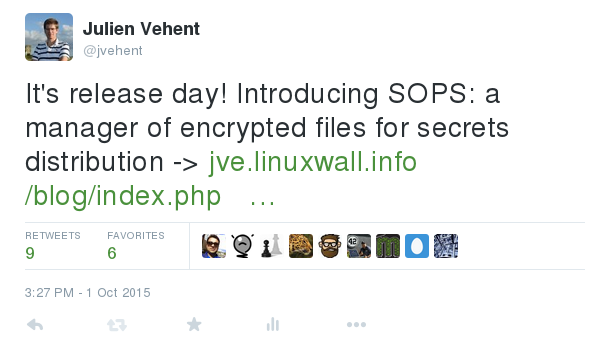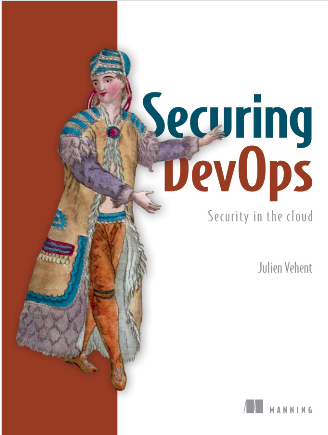Automating the distribution of secrets and credentials to components of an infrastructure is a hard problem. We know how to encrypt secrets and share them between humans, but extending that trust to systems is difficult. Particularly when these systems follow devops principles and are created and destroyed without human intervention. The issue boils down to establishing the initial trust of a system that just joined the infrastructure, and providing it access to the secrets it needs to configure itself.
The initial trust
In many infrastructures, even highly dynamic ones, the initial trust is established by a human. An example is seen in Puppet by the way certificates are issued: when a new system attempts to join a Puppetmaster, an administrator must, by default, manually approve the issuance of the certificate the system needs. This is cumbersome, and many puppetmasters are configured to auto-sign new certificates to work around that issue. This is obviously not recommended and far from ideal.
AWS provides a more flexible approach to trusting new systems. It uses a powerful mechanism of roles and identities. In AWS, it is possible to verify that a new system has been granted a specific role at creation, and it is possible to map that role to specific resources. Instead of trusting new systems directly, the administrator trusts the AWS permission model and its automation infrastructure. As long as AWS keys are safe, and the AWS API is secure, we can assume that trust is maintained and systems are who they say they are.
KMS, Trust and secrets distribution
Using the AWS trust model, we can create fine grained access controls to Amazon's Key Management Service (KMS). KMS is a service that encrypts and decrypts data with AES_GCM, using keys that are never visible to users of the service. Each KMS master key has a set of role-based access controls, and individual roles are permitted to encrypt or decrypt using the master key. KMS helps solve the problem of distributing keys, by shifting it into an access control problem that can be solved using AWS's trust model.
Since KMS's inception a few months ago, a number of projects have popped up to use its capabilities to distribute secrets: credstash and sneaker are such examples. Today I'm introducing sops: a secrets editor that uses KMS and PGP to manage encrypted files.
SOPS: Secrets OPerationS
A few weeks ago, Mozilla's Services Operations team started revisiting the issue of distributing secrets to EC2 instances, with a goal to store these secrets encrypted until the very last moment, when they need to be decrypted on target systems. Not unlike many other organizations that operate sufficiently complex automation, we found this to be a hard problem with a number of prerequisites:
- Secrets must be stored in YAML files for easy integration into hiera
- Secrets must be stored in GIT, and when a new CloudFormation stack is built, the current HEAD is pinned to the stack. (This allows secrets to be changed in GIT without impacting the current stack that may autoscale).
- Encrypt entries separately. Encrypting entire files as blobs makes git conflict resolution almost impossible. Encrypting each entry separately is much easier to manage.
- Secrets must always be encrypted on disk (admin laptop, upstream git repo, jenkins and S3) and only be decrypted on the target systems
Daniel Thornton and I brainstormed a number of ideas, and eventually ended-up with a workflow similar to the one described below.
The idea behind SOPS is to provide a wrapper around a text editor that takes care of the encryption and decryption transparently. When creating a new file, sops generates a data encryption key "Kd" that is itself encrypted with one or more KMS master keys and PGP public keys. Kd is used to encrypt the content of the file with AES256-GCM. In order to decrypt the files, sops must have access to any of the KMS or PGP master keys.
SOPS can be used to encrypt YAML, JSON and TEXT files. In TEXT mode, the content of the file is treated as a blob, the same way PGP would encrypt an entire file. In YAML and JSON modes, however, the content of the file is manipulated as a tree where keys are stored in cleartext, and values are encrypted. hiera-eyaml does something similar, and over the years we learned to appreciate its benefits, namely:
- diff are meaningful. If a single value of a file is modified, only that value will show up in the diff. The diff is still limited to only showing encrypted data, but that information is already more granular that indicating that an entire file has changed.
- conflicts are easier to resolve. If multiple users are working on the same encrypted files, as long as they don't modify the same values, changes are easy to merge. This is an improvement over the PGP encryption approach where unsolvable conflicts often happen when multiple users work on the same file.
# edit a file
$ sops example.yaml file written to example.yaml
# take a look at the diff
$ git diff example.yaml diff --git a/example.yaml b/example.yaml index 00fe479..5f40330 100644 --- a/example.yaml +++ b/example.yaml @@ -1,5 +1,5 @@ # The secrets below are unreadable without access to one of the sops master key -myapp1: ENC[AES256_GCM,data:Tr7oo=,iv:1vw=,aad:eo=,tag:ka=]
+myapp1: ENC[AES256_GCM,data:krm,iv:0Y=,aad:KPyE=,tag:oIA==]
app2: db: user: ENC[AES256_GCM,data:YNKE,iv:H4JQ=,aad:jk0=,tag:Neg==]
Below are two examples of SOPS encrypted files. The first one in YAML, the second one in JSON:
YAML
cleartext:
# The secrets below are unreadable without access to one of the sops master key
myapp1: t00m4nys3cr3tzupdated
app2:
db:
user: eve
password: c4r1b0u
# private key for secret operations in app2
key: |
-----BEGIN RSA PRIVATE KEY-----
MIIBPAIBAAJBAPTMNIyHuZtpLYc7VsHQtwOkWYobkUblmHWRmbXzlAX6K8tMf3Wf
ImcbNkqAKnELzFAPSBeEMhrBN0PyOC9lYlMCAwEAAQJBALXD4sjuBn1E7Y9aGiMz
bJEBuZJ4wbhYxomVoQKfaCu+kH80uLFZKoSz85/ySauWE8LgZcMLIBoiXNhDKfQL
vHECIQD6tCG9NMFWor69kgbX8vK5Y+QL+kRq+9HK6yZ9a+hsLQIhAPn4Ie6HGTjw
fHSTXWZpGSan7NwTkIu4U5q2SlLjcZh/AiEA78NYRRBwGwAYNUqzutGBqyXKUl4u
Erb0xAEyVV7e8J0CIQC8VBY8f8yg+Y7Kxbw4zDYGyb3KkXL10YorpeuZR4LuQQIg
bKGPkMM4w5blyE1tqGN0T7sJwEx+EUOgacRNqM2ljVA=
-----END RSA PRIVATE KEY-----
number: 1234567890
an_array:
- secretuser1
- secretuser2
- somelongvalueAAAAAAAAAAAAAAAAAAAAAAAAAAAAAAAAAAAAAAAAAAAAA
- some other value
encrypted:
# The secrets below are unreadable without access to one of the sops master key
myapp1: ENC[AES256_GCM,data:krwEdH2fxWRexFuvZHS816Wz46Lm,iv:0STqWePc0HOPuDn2EizQdNepx9ksx0guHGeKrshlYSY=,aad:Krl8HyPGQmnIWIZh74Ib+y0OdiVEvRDBv3jTdMGSPyE=,tag:oI2THtQeUX4ZLNnbrdel2A==]
app2:
db:
user: ENC[AES256_GCM,data:YNKE,iv:H9CDb4aUHBJeF2MSTKHQuOwlLxQVdx12AhT0+Dob4JQ=,aad:jlF2KvytlQIgyMpOoO/BiQbukiMwrh1j94Oys+YMgk0=,tag:NeDysIHV9CGtMAQq9i4vMg==]
password: ENC[AES256_GCM,data:p673JCgHYw==,iv:EOOeivCp/Fd80xFdMYX0QeZn6orGTK8CeckmipjKqYY=,aad:UAhi/SHK0aCzptnFkFG4dW8Vv1ASg7TDHD6lui9mmKQ=,tag:QE6uuhRx+cGInwSVdmxXzA==]
# private key for secret operations in app2
key: |-
ENC[AES256_GCM,data:Ea3zTFSOlg1PDZmBa1U2dtKl3pO4nTmaFswJx41fPfq3u8O2/Bq1UVfXn2SrO13obfr6xH4zuUceCDTvW2qvphlan5ir609EXt4dE2TEEcjVKhmAHf4LMwlZVAbvTJtlsnvo/aYJH95uctjsSX5h8pBlLaTGBGYwMrZuMyRU6vdcMWyha+piJckUc9sq7fevy1TSqIxf1Usbn/0NEklWm2VSNzQ2Urqtny6EXar+xU7NfYSRJ3mqmcJZ14oIeXPdpk962RwMEFWdYrbE7D59kWU2BgMjDxYJD5KXpWiw2YCrA/wsATxVCbZlwqC+TJFA5WAUZX756mFhV/t2Li3zQyDNUe6KkMXV9qwf/oV1j5sVRVFsKDYIBqhi3qWBVA+SO9RloQMjhru+IsdbQcS4LKq/1DrBENeZuJ0djUAxKLVfJzMGUf89ju3m9IEPovW8mfF0RbfAGRwFHMO9nEXCxrTLERf3owdR3u4j5/rNBpIvvy1z+2dy6sAx/eyNdS+cn5qO9BPAxsXpSwkaI96rlBagwH1Pfxus0x/D00j93OpE+M8MgQ/9LA68FlCFU4OAQlvw8f7MPoxnq+/+gFTS/qqjTR6EoUuX5NH2WY93YCC5TCbe4GOXyP0H05PbIWq55UMVLNcpAyac3gO4kL5O5U8=,iv:Dl61tsemKH0fdmNul/PmEEsRYFAh8GorR8GRupus/EM=,aad:Ft2aSYYukD1x8pMj1WvmodLjJV6waPy5FqdlImWyQKA=,tag:EPg4KpWqni/buCFjFL857A==]
number: ENC[AES256_GCM,data:XMrBalgZ9tvBxQ==,iv:XyEAAaIzVy/2trnJhLrjMInLg8tMI4CAX9+ccnj3T1Y=,aad:JOlAkP159UxDjL1CrumTuQDqgW2+VOIwz7bdfaJIIn4=,tag:WOHOMJS4nhSdj/aQcGbU1A==]
an_array:
- ENC[AES256_GCM,data:td1aAv4s4cOzSo0=,iv:ErVqte7GpQ3JfzVpVRf7pWSQZDHn6W0iAntKWFsMqio=,aad:RiYy8fKX/yVY7KRgXSOIzydT0+TwK7WGzSFSy+1GmVM=,tag:aSGLCmNZsGcBjxEGvNQRwA==]
- ENC[AES256_GCM,data:2K8C418jef8zoAY=,iv:cXE4Hwdl4ZHzAHHyyXqaIMFs0mn65JUehDdaw/aM0WI=,aad:RlAgUZUZ1DvxD9/lZQk9KOHKl4L+fYETaAdpDVekCaA=,tag:CORSBzis6Vy45dEvT/UtMg==]
- ENC[AES256_GCM,data:hbcOBbsaWmlnrpeuwLfh1ttsi8zj/pxMc1LYqhdksT/oQb80g2z0FE4QwUVb7VV+x98LAWHofVyV8Q==,iv:/sXHXde82r2FyG3Z3vC5x8zONB14RwC0GmtkiYEUNLI=,aad:BQb8l5fZzF/aa/EYnrOQvRfGUTq9QmJOAR/zmgOfYDA=,tag:fjNeg3Manjl6B2U2oflRhg==]
- ENC[AES256_GCM,data:LLHkzGobqL53ws6E2zglkA==,iv:g9z3zz4DUzJr4Cim0SVqKF736w2mZoItqbB0TcsGrQU=,aad:Odrvz0loqFdd9wKJz0ULMX/lyEQcX8WaHE59MgeXkcI=,tag:V+rV/AeZ4uEgtwGhlamTag==]
sops:
kms:
- enc: CiC6yCOtzsnFhkfdIslYZ0bAf//gYLYCmIu87B3sy/5yYxKnAQEBAQB4usgjrc7JxYZH3SLJWGdGwH//4GC2ApiLvOwd7Mv+cmMAAAB+MHwGCSqGSIb3DQEHBqBvMG0CAQAwaAYJKoZIhvcNAQcBMB4GCWCGSAFlAwQBLjARBAyGdRODuYMHbA8Ozj8CARCAO7opMolPJUmBXd39Zlp0L2H9fzMKidHm1vvaF6nNFq0ClRY7FlIZmTm4JfnOebPseffiXFn9tG8cq7oi
enc_ts: 1439568549.245995
arn: arn:aws:kms:us-east-1:656532927350:key/920aff2e-c5f1-4040-943a-047fa387b27e
pgp:
- fp: 85D77543B3D624B63CEA9E6DBC17301B491B3F21
enc: |
-----BEGIN PGP MESSAGE-----
Version: GnuPG v1
hQIMA0t4uZHfl9qgAQ//ZvUMJOLUJyzKa/Uigwh1jKVhx3feHUitVjCWBfVTPgj1
rRbaTcaF/mYi+rLdW+6kmAg1UEPoVgEBEiBvCTcHjyDzw3m0DoQwvK85nqOpEhkx
rjU1XAnKZ8LNFfIaj8Xo/L6qzE882gwOhfCPU+QmnkWdijs6dQof06DButQDTx5D
KlFvr9CgSa52/uPazZ41disho9guS06k+KrV/P2F4jrU5aB5mfP7YZY9mkVcm2bv
9C5O9neNlXcivgWqKQjB5fmv1Z9yUFAUBNg98wjT8o5Hxz6P6hIbV3f+vn/Vu+VZ
Qo+E7g3/2ItaT89KAIVXgQdHhwJneoDBVpJ4rYz7LLbcvEyAbipKIY4Fl3Cn1ggH
9odIZWA6FWZxHNhRVonMVHZ8Jei5NkUdpJltjDmPJpl3B+7XiWg4NS8dp860fLeL
8nrkR0Z4nVK8DNg+7nQiOxHL9wye6ljWl7/xapJ5r+mYA6eLybsSSlxDo9/OmeON
CYo3jV8HT8amrXYVi4MyZ3LV2TTyGVPObnthYEN2lPSJmms6ei6t/xKaZtAj6779
EzGbUP9VpTKKf5tqGcy9MeGEk2p5ed5hJGinrrt92cNIebcMBJpkLQAy++V/fKnH
Meecaoj1NThBnRguNuz73WSy2C5u/g7OoI50HJJCmoVXY+8D64tWmCZc8Ib2fprS
XgFcoR9u5yPkLZW8xASpRXfKKTbRTTjAXdYEyaYuuOW2nFWo62/d1mZsT7kY21ja
AhVVoxwsj45FCuk63bDVceAJJm+9xxufMp0gNW1GUk858VLyE8gn+uAB5zBcS5c=
=BN/t
-----END PGP MESSAGE-----
created_at: 1443203323.058362
JSON
cleartext
{
"address": {
"city": "New York",
"postalCode": "10021-3100",
"state": "NY",
"streetAddress": "21 2nd Street"
},
"age": 25,
"firstName": "John",
"lastName": "Smith",
"phoneNumbers": [
{
"number": "212 555-1234",
"type": "home"
},
{
"number": "646 555-4567",
"type": "office"
}
]
}
encrypted:
{
"address": {
"city": "ENC[AES256_GCM,data:2wNRKB+Sjjw=,iv:rmATLCPii2WMzcT80Wp9gOpYQqzx6juRmCf9ioz2ZLM=,aad:dj0QZW0BvZVjF1Dn25hOJpcwcVB0qYvEIhGWgxq6YzQ=,tag:wOoPYU+8BA9DiNFlsal3Aw==]",
"postalCode": "ENC[AES256_GCM,data:xwWZ/np9Gxv3CQ==,iv:OLwOr7iliPyWWBtKfUUH7E1wQlxJLA6aFxIfNAEC/M0=,aad:8mw5NU8MpyBlrh7XaUqa642jeyJWGqKvduaQ5bWJ5pc=,tag:VFmnc4Ay+yKzyHcrKeEzZQ==]",
"state": "ENC[AES256_GCM,data:3jY=,iv:Y2bEgkjdn91Pbf5RgJMbyCsyfhV7XWdDhe8wVwTQue0=,aad:DcA5kW1rrET9TxQ4kn9jHSpoMlkcPKs5O5n9wZjZYCQ=,tag:ad1xdNnFwkqx/8EOKVVHIA==]",
"streetAddress": "ENC[AES256_GCM,data:payzP57DGPl5S9Z7uQ==,iv:UIz34fk9zH4z6hYfu0duXmAnI8CqnoRhoaIUqg1YoYA=,aad:hll9Baw40lMjwj7HePQ1o1Lsuh1LCwrE6+bkG4025sg=,tag:FDBhYxMmJ1Wj/uxYxdvVZg==]"
},
"age": "ENC[AES256_GCM,data:4Y4=,iv:hi1iSH19dHSgG/c7yVbNj4yzueHSmmY46yYqeNCoX5M=,aad:nnyubQyaWeLTcz9k9cMHUlgTwVDMyHf32sWCBm7KWAA=,tag:4lcMjstadzI8K40BoDEfDA==]",
"firstName": "ENC[AES256_GCM,data:KVe8Dw==,iv:+eg+Rjvaqa2EEp6ufw9c4hwWwObxRLPmxx3fG6rkyps=,aad:3BdHcorHfbvM2Jcs96zX0JY2VQL5dBNgy7zwhqLNqAU=,tag:5OD6MN9SPhBmXuA81hyxhQ==]",
"lastName": "ENC[AES256_GCM,data:1+koqsI=,iv:b2kBxSW4yOnLFc8qoeylkMtiO/6qr4cZ5VTntXTyXO8=,aad:W7HXukq3lUUMj9i57UehILG2NAp8XCgJMYbvgflWJIY=,tag:HOrgi1L+IRP+X5JGMnm7Ig==]",
"phoneNumbers": [
{
"number": "ENC[AES256_GCM,data:Oo0IxdtBrnfE+bTf,iv:tQ1E/JQ4lHZvj1nQnGL2sKE30sCctjiMCiagS2Yzch8=,aad:P+m5gD3pKfNEOy6t61vbKhEpPtMFI2NZjBPrD/m8T9w=,tag:6iRMUVUEx3UZvUTGTjCdwg==]",
"type": "ENC[AES256_GCM,data:M3zOKQ==,iv:pD9RO4BPUVu6AWPo2DprRsOqouN+0HJn+RXQAXhfB2s=,aad:KFBBVEEnSjdmah3i2XmPx7wWEiFPrxpnfKYW4BSolhk=,tag:liwNnip/L6SZ9srn0N5G4g==]"
},
{
"number": "ENC[AES256_GCM,data:BI2f/qFUea6UHYQ+,iv:jaVLMju6h7s+AlF7CsPbpUFXO2YtYAqYsCIsyHgfrfI=,aad:N+8sVpdTlY5I+DcvnY018Iyh/QesD7bvwfKHRr7q2L0=,tag:hHPPpQKP4cUIXfh9CFe4dA==]",
"type": "ENC[AES256_GCM,data:EfKAdEUP,iv:Td+sGaS8XXRqzY98OK08zmdqsO2EqVGK1/yDTursD8U=,aad:h9zi8s+EBsfR3BQG4r+t+uqeChK4Hw6B9nJCrValXnI=,tag:GxSk1LAQIJNGyUy7AvlanQ==]"
}
],
"sops": {
"kms": [
{
"arn": "arn:aws:kms:us-east-1:656532927350:key/920aff2e-c5f1-4040-943a-047fa387b27e",
"created_at": 1443204393.48012,
"enc": "CiC6yCOtzsnFhkfdIslYZ0bAf//gYLYCmIu87B3sy/5yYxKnAQEBAgB4usgjrc7JxYZH3SLJWGdGwH//4GC2ApiLvOwd7Mv+cmMAAAB+MHwGCSqGSIb3DQEHBqBvMG0CAQAwaAYJKoZIhvcNAQcBMB4GCWCGSAFlAwQBLjARBAwBpvXXfdPzEIyEMxICARCAOy57Odt9ngHHyIjVU8wqMA4QszXdBglNkr+duzKQO316CRoV5r7bO8JwFCb7699qreocJd+RhRH5IIE3"
},
{
"arn": "arn:aws:kms:ap-southeast-1:656532927350:key/9006a8aa-0fa6-4c14-930e-a2dfb916de1d",
"created_at": 1443204394.74377,
"enc": "CiBdfsKZbRNf/Li8Tf2SjeSdP76DineB1sbPjV0TV+meTxKnAQEBAgB4XX7CmW0TX/y4vE39ko3knT++g4p3gdbGz41dE1fpnk8AAAB+MHwGCSqGSIb3DQEHBqBvMG0CAQAwaAYJKoZIhvcNAQcBMB4GCWCGSAFlAwQBLjARBAwag3w44N8+0WBVySwCARCAOzpqMpvzIXV416ycCJd7mn9dBvjqzkUDag/zHlKse57uNN7P0S9GeRVJ6TyJsVNM+GlWx8++F9B+RUE3"
}
],
"pgp": [
{
"created_at": 1443204394.748745,
"enc": "-----BEGIN PGP MESSAGE-----\nVersion: GnuPG v1\n\nhQIMA0t4uZHfl9qgAQ//dpZVlRD9WGvz6Pl+PRKvBf661IHLkCeOq5ubzqLIJZu7\nJMNu0KBoO0qX+rgIQtzMU+04QlbIukw01q9ELSDYjBDQPRQJ+6OAeauawxf5mPGa\nZKOaSuoCuPbfOmGj8AENdSCpDaDz+KvOPvo5NNe16kC8BeerFJGewyEwbnkx5dxZ\ngk+LJBOuWRVUEzjsB1pzGfGRzvuzHcrUzWAoA8N936hDFIpoeDYC/8KLc0CWTltA\nYYGaKh5cZxC0R0TgQ5S9GjcU2nZjhcL94XRxZ+9BZDLCDRnjnRfUpPSTHoxr9wmR\nAuLtgyCIolrPl3fqRLJSLUH6FyTo2CO+2mFSx7y9m2OXkKQd1z2tkOlpC9PDTjGT\nVfGvy9nMUsmrgWG35soEmk0nNJaZehiscvZfomBnnHQgqx7DMSMxAnBneFqjsyOQ\nGK7Jacs/tigxe8NZcYhx+usITeQzVLmuqZ2pO5nEGyq0XJhJjxce9YVaeC4QOft0\nlm6qq+m6oABOdKTGh6zuIiWxU1r417IEgV8mkwjlraAvNNPKowQq5j8dohG4HaNK\nOKoOt8aIZWvD3HE9szuH+uDRXBBEAbIvnojQIyrqeIYv1xU8hDTllJPKw/kYD6nx\nMKrw4UAFand5qAgN/6QoIrOPXC2jhA2VegXkt0LXXSoP1ccR4bmlrGRHg0x6Y8zS\nXAE+BVEMYh8l+c86BNhzVOaAKGRor4RKtcZIFCs/Gpa4FxzDp5DfxNn/Ovrhq/Xc\nlmzlWY3ywrRF8JSmni2Asxet31RokiA0TKAQj2Q7SFNlBocR/kvxWs8bUZ+s\n=Z9kg\n-----END PGP MESSAGE-----\n",
"fp": "85D77543B3D624B63CEA9E6DBC17301B491B3F21"
}
]
}
}
As you can see on each key/value pair, only the values are encrypted and keys are kept in clear. It can be argued that this approach leaks sensitive information, but it’s a tradeoff we’re willing to accept in exchange for an increased usability.
Simplifying key management
OpenPGP gets a lot of bad press for being an outdated crypto protocol, and while true, what really made look for alternatives is the difficulty to manage and distribute keys to systems. With KMS, we manage permissions to an API, not keys, and that's a lot easier to do.
But PGP is not dead yet, and we still rely on it heavily as a backup solution: all our files are encrypted with KMS and with one PGP public key, with its private key stored securely for emergency decryption in the event that we lose all our KMS master keys.
That said, nothing prevents you from using SOPS the same way you would use an encrypted PGP file: by referencing the pubkeys of each individual who has access to the file. It can easily be done by providing sops with a comma-separated list of public keys when creating a new file:
$ sops --pgp "E60892BB9BD89A69F759A1A0A3D652173B763E8F, 84050F1D61AF7C230A12217687DF65059EF093D3, 85D77543B3D624B63CEA9E6DBC17301B491B3F21" mynewfile.yaml
Updating the master keys
GnuPG can be a little obscure when it comes to managing the keys that have access to a file. While its command line is powerful, it takes a few minutes to find the right commands and figure out how to provide access to a new member of the team.
In SOPS, managing master keys is easy: they are simply stored as entries of the document under sops->{kms,pgp}. By default, that information is hidden during editing, but calling sops with the "-s" flag will display the master keys in the editor. From there, add new keys by creating entry in the document, or remove them by deleting the lines.
Rotation
Rotating data keys is also trivial: sops provides a rotation flag "-r" that will generate a new data key Kd and re-encrypt all values in the file with it. Coupled with in-place encryption/decryption, it is easy to rotate all the keys on a group of files:
for file in $(find . -type f -name "*.yaml"); do
sops -d -i $file
sops -e -i -r $file
done
Something that should be done every few months for good practice ;)
Assuming roles
SOPS has the ability to use KMS in multiple AWS accounts by assuming roles in each account. Being able to assume roles is a nice feature of AWS that allows administrator to establish trust relationships between accounts, typically from the most secure account to the least secure one. In our use-case, we use roles to indicate that a user of the Master AWS account is allowed to make use of KMS master keys in development and staging AWS accounts. Using roles, a single file can be encrypted with KMS keys in multiple accounts, thus increasing reliability and ease of use.
Check it out, and contribute!
SOPS is available on Github at http://github.com/mozilla/sops and on Pypi at https://pypi.python.org/pypi/sops. We are progressively reaching a stable stage, with a goal to support Python 2.6.6 to 3.4.




